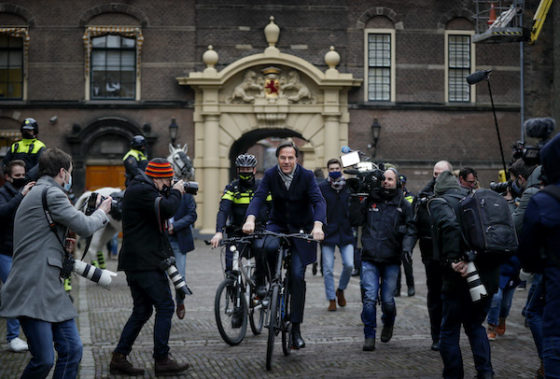Cabinet’s resignation will not affect coronavirus plan, says Rutte


The resignation of the entire Dutch cabinet on Friday formed a dramatic conclusion to the tax office benefits scandal, but it will make little change to the day-to-day business of running the country.
After submitting his resignation to the king, Mark Rutte will continue as prime minister in a caretaker capacity with his team of ministers – with the exception of economic affairs minister Eric Wiebes, who quit the cabinet because of his personal involvement in the affair.
Rutte stressed at his press conference on Friday that the government’s response to the coronavirus pandemic would not be hampered by the loss of its mandate. ‘There is still a majority in parliament for the corona plan,’ he said.
He also promised the process of compensating parents who suffered as a result of the tax office’s anti-fraud strategy would not be impeded – although the €30,000 that parents were promised in December will not arrive in their bank accounts before May at the earliest.
‘I am confident that parliament will do all it can to ensure that your compensation takes shape quickly and that all steps are taken to prevent a repeat,’ Rutte said.
Caretaker governments – known as ‘demissionair‘ in Dutch – are not exceptional in the Netherlands. Once a cabinet’s term has ended ministers stay in office until negotiations to form a new government have concluded – a process that can take several months.
Rutte op de fiets naar de koning om ontslag kabinet aan te bieden.
Op de fiets? “Ja, ik heb niets anders.” pic.twitter.com/KElFuULi85
— Auke van Eijsden (@AukevanEijsden) January 15, 2021
The current cabinet was sworn in on October 17, 2017, following the election on March 15. This was the longest ever negotiation period, mainly because four parties were needed to form a government and the first round of talks collapsed when GroenLinks withdrew.
Once a cabinet has become a caretaker government, parliament decides which policy areas are essential and urgent, and which are ‘controversial’ and therefore off-limits. The pandemic response will be seen as urgent, allowing the government to continue to devise and implement rules on curfews, vaccinations and social distancing.
But even within the constraints of a caretaker administration, the governing parties still have considerable scope to pass legislation. After the collapse of Rutte’s first cabinet in 2012, which was brought down when Geert Wilders refused to sign off a €16 billion emergency austerity package, the Netherlands still needed to make urgent cuts in its budget to meet the terms of the European Growth and Stability Pact.
Though Wilders’ PVV no longer supported the minority government of the right-wing Liberal (VVD) and Christian Democrat parties, finance minister Jan Kees de Jager managed to cobble together a five-party coalition to draw up a €12.4 billion package of measures within two days.
Because the ad hoc alliance – known as the Kunduzakkoord because the same parties had supported a military operation in Afghanistan – had a majority in parliament, the budget package was passed in April, even though the general election did not take place until September.
Rutte’s third term had just two months to run – the last three weeks of which would be taken up by the election campaign – and no major new pieces of legislation were in the pipeline.
However, the resignation of an entire government is an exceptional step that was last taken by Wim Kok’s government in 2002 when it accepted responsibility for the Dutch military forces’ role in the massacre at Srebrenica during the Yugoslav Wars.
Thank you for donating to DutchNews.nl.
We could not provide the Dutch News service, and keep it free of charge, without the generous support of our readers. Your donations allow us to report on issues you tell us matter, and provide you with a summary of the most important Dutch news each day.
Make a donation